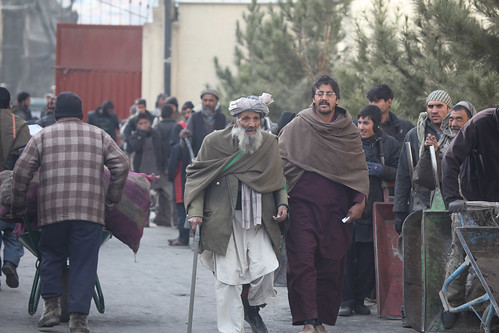Januar-Bilanz in Afghanistan: 700 Zwischenfälle, 1.600 Tote (mit Ergänzungen)
Afghanistan ist nicht nur wegen anderer Krisen aus den Schlagzeilen verschwunden. Sondern auch, weil im Westen nur noch gelegentlich zusammenfassende Statistiken ein Bild der (Sicherheits)Lage geben. Deshalb ein Blick auf die Januar-Bilanz des afghanischen TV-Senders TOLONews: Im ersten Monat dieses Jahres wurden bei 700 Vorfällen rund 1.500 Menschen getötet.
TOLOnews‘ monthly security report indicates that 696 insecurity events were recorded across the country in January; the month after the Afghan troops took over complete security responsibility of the country.
Based on the report, 1,324 armed oppositions, 171 Afghan forces and 108 civilians were killed during the first month of 2015 after NATO forces formally ended their 13-year combat mission.
Die ganze Meldung hier. Und ein anderer Bericht des Senders aus der Nord-Provinz Jowzjan über Aktivitäten der islamistischen ISIS-Milizen, in Afghanistan als Daesh bezeichnet, klingt auch nicht so gut; auch wenn diese Erkenntnisse Angaben der Regierung in Kabul widersprechen:
Six-hundred Taliban militants have rebranded themselves in northern Jowzjan province by changing their physical appearance and raising black flags in the name of Daesh, according to provincial officials.
These statements were expressed Wednesday by Jowzjan Police Chief Gen. Faqir Mohammad Jowzjani after rumors about the presence of Daesh fighters grew in several parts of the country.
„Taliban are now operating under the name of Daesh by raising their flags,“ Jowzjani said. „The number of these militants has reached 600 causing insecurity in a number of districts.“
Nachtrag1: Ergänzend dazu diese AFP-Meldung:
Afghanistan Could Become I.S. Haven: ex-CIA Officer
Afghanistan is in danger of turning into a sanctuary once again for Islamist extremists as the West withdraws troops and shifts its attention elsewhere, a former senior CIA official warned Tuesday.
The country could even become a refuge for Islamic State jihadists now waging war in Syria and Iraq, said Robert Grenier, the former Central Intelligence Agency station chief in Islamabad and author of a new book.
und passend dazu eine aktuelle Übersicht vom Afghanistan Analysts Network:
The Shadows of ‘Islamic State’ in Afghanistan: What threat does it hold?
Nachtrag 2: Weil’s noch relevant werden könnte, eine Meldung der Washington Post, zwar von gestern, aber irgendwie untergegangen:
White House weighs adjusting Afghan exit plan to slow withdrawal of troops
The Obama administration is considering slowing its planned withdrawal from Afghanistan for the second time, according to U.S. officials, a sign of the significant security challenges that remain despite an end to the U.S. and NATO combat mission there.
Under the still-evolving plans, Army Gen. John F. Campbell, the commander of U.S. and NATO forces in Afghanistan, could be given greater latitude to determine the pace of the drawdown in 2015 as foreign forces scramble to ensure Afghan troops are capable of battling Taliban insurgents on their own, the officials said.
The options under discussion would not alter what is perhaps the most important date in President Obama’s plan: ending the U.S. military mission entirely by the time he steps down in early 2017.
(Foto: Verteilung von Winterhilfe an bedürftige Afghanen im Januar 2015 durch die UN-Mission in Afghanistan – Sayed Muhammad Shah / UNAMA)



Diese Entwicklung war zu erwarten. Das bedeutet, auch der Einsatz der deutschen Soldaten ist im Ergebnis wirkungslos geblieben, ausgenommen fuer diejenigen Afghanen, die jetzt nach DE mitgenommen werden.
Eine Rückschau und Sammlung von -unvollständigen- Fakten:
– bereits während des Afghanistankrieges 1979-89 gab es in und um AFG Ausbildungslager verschiedener Fraktionen, teilweise von externen Akteuren (USA, PAK, SAU, ARE) unterstützt
– nach dem Abzug der RUS SK wurden diese weiter genutzt, nämlich um ausländische Kämpfer für den Globalen Dschihad auszubilden; einige der Kämpfer wurden zum Kampf oder Aufbau von Terrorzellen Anfang der 1990er nach Europa (FRA), Nordafrika, auch nach Bosnien geschickt und verübten dann Anschläge in Paris, später Ostafrika, erstes Mal NY: WTC
– signifikant wurden diese Lager erst ab 2001 dezimiert; neue Ausbildungsstätten wurden in der Folge im Irak (2003 wg. hingenommenen Staatszerfall) u. anderswo gegründet
– jetzt breiten sich in Teilen Syriens und in Mesopotamien Da’esch/ ISIS, andere Gruppen aus und rekrutieren doch tatsächlich neue Kämpfer
– you name it…
Aus dieser kleinen Kette von einschlägigen Ereignissen lässt sich zumindest vorsichtig eine gewisse Wahrscheinlichkeit ableiten: es wird weiter Rückzugsgebiete und Ausbildungslager von und für dschihadistische Kämpfer geben. Vor allem dort, wo sich das Gewaltmonopol nicht oder nur teilweise in nationalstaatlicher Hand befindet (AFG, Westpakistan, Sub-Sahara) oder es gar keinen funktionierenden Staat mehr gibt.
Au Weia! Das ist noch lange nicht vorbei…
Die Gründe für den Zulauf von jungen Menschen in Richtung ISIS et al. sind sicher vielschichtig.
Ich hoffe, dass wir aber zukünftig bereits im europ. Inland, nach den ersten ehrlichen Augenzeugenberichten von Rückkehrern über die wahren Umtriebe des ISIS, mehr Einfluss auf scheinbar perspektivlose Menschen nehmen können.
Im Bezug auf AFG wäre dann ein klares Signal seitens der Bundesregierung zu setzen: die volle Unterstützung umsiedlungswilliger ehem. afghanischer Ortskräfte. Jemand der hier offen Willkommen geheißen wird und vom Honig unserer Freiheit kosten darf, der überlegt es sich dreimal, ob er dies zwecks dschihadistischer Umtriebe zuungunsten seiner hier aufwachsenden Kinder aufs Spiel setzen wird….